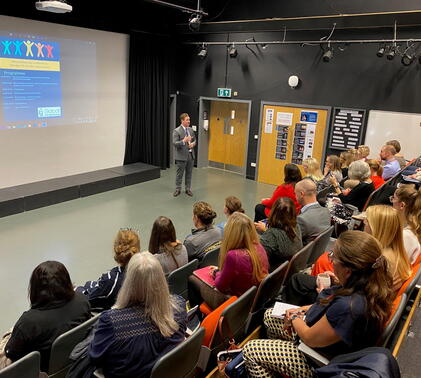
This week, we hosted conference speakers including Neurodiversity Unravelled, Sidcot Parents’ Neurodiversity Network and Fin O’Regan, who presented to an audience of educational professionals from the South West, parents and friends.
We were delighted to be joined by fifty educational professionals from schools across the South West today for a deep-dive discussion around neurodiversity and how best to foster inclusivity and support neurodivergent pupils in schools.
The conference began with a session from the directors of Neurodiversity Unravelled, Louise Lawrence and Dr Rebecca Varrall, who stressed that a neuro-affirmative approach recognises that all brains work differently. They shared various neurodivergent overlap statistics, acknowledging that many individuals with one diagnosis, may have many other presentations too. Creating a whole school, neuro-inclusive environment, capable of person-centred adjustments, is tremendously important to maximise learning potential.
With 20% of the population being neurodivergent, Louise and Rebecca acknowledged that neurodivergent individuals are diverse as a group, sharing traits, but they are not the same. Supporting individual children to speak up and advocate for how they best learn and engaging them to improve their self-esteem is very important for education professionals wanting to support their pupils to become positive, confident neurodivergent learners.
While discussing some key diagnoses including dyslexia, dyscalculia, and dyspraxia, Louise and Rebecca outlined recurring elements of the conditions, from the characteristics and key strengths to ways in which teachers and education professionals might best support them. The audience was reminded of the fatigue that many of these conditions can cause and encouraged to bear this in mind.
The speakers reiterated that a neurodiversity affirmative framework focused on inclusion results in pupils who are better engaged with education and maximise learning potential, stating, "Accommodations do not modify the curriculum – they create access to master the curriculum.” They proceeded to give delegates multiple working examples of how this might best be implemented in practice, including classroom organisation, use of equipment and providing a multi-sensory approach to teaching.
Parent Session
Delegates were then invited to hear from a group of Sidcot parents who have developed a supportive network that meets regularly to share stories and their own experiences of having neurodiverse children (one of whom also bravely spoke to the audience). They movingly spoke to the conference delegates about their own experiences, particularly about masking. They also produced a booklet with further information, which can be found here.
Fin O’Regan
The conference concluded with expert speaker Fintan O’Regan encouraging teachers and education staff to look at “traits rather than terms”. With increasing awareness of the overlap of neurodiverse presentations, he gave helpful insights into increasing learning and maximising potential. He highlighted that “ADHD is actually a developmental difference – not a ‘deficit’ and not a ‘disorder’. This is pervasive – affecting more than one setting. It is also enduring and can last long beyond childhood.”
Fin outlined his ‘SF3R’ process for supporting neurodiverse pupils, encouraging Structure (rules, rituals and routines), Flexibility (mood and motivation), Rapport (effective communication with children and young persons, including practical strategies for dealing with frustration), Responsibility, and Regulation.
Finally, he highlighted statistics that show children with SEND requirements are three times more likely to be bullied than those who do not. By increasing awareness and acceptance by all—by creating “upstanders, not bystanders”—we create a more productive learning environment and, ultimately, society for everyone.
Fin also spoke to over seventy Sidcot parents on the same topic in an evening session arranged as part of the School’s ‘21st Century Parenting’ series, which has included expert speakers on Vaping and Drugs, Body Image and Online Safety.
Joanna Leite, Deputy Head – Pastoral at Sidcot School, commented, “I’d like to thank all the schools who attended the conference today for joining us in learning about the most recent techniques and research around neurodiversity. Our expert speakers gave us fascinating insights and practical techniques to explore in our schools and with our colleagues to ensure that we maximise learning potential for all. My thanks also go to our own Neurodiversity Parent Network, who all spoke so passionately about their own experiences and reminded us of the importance of this key topic, the latest in our 21st Century Parenting programme”.


